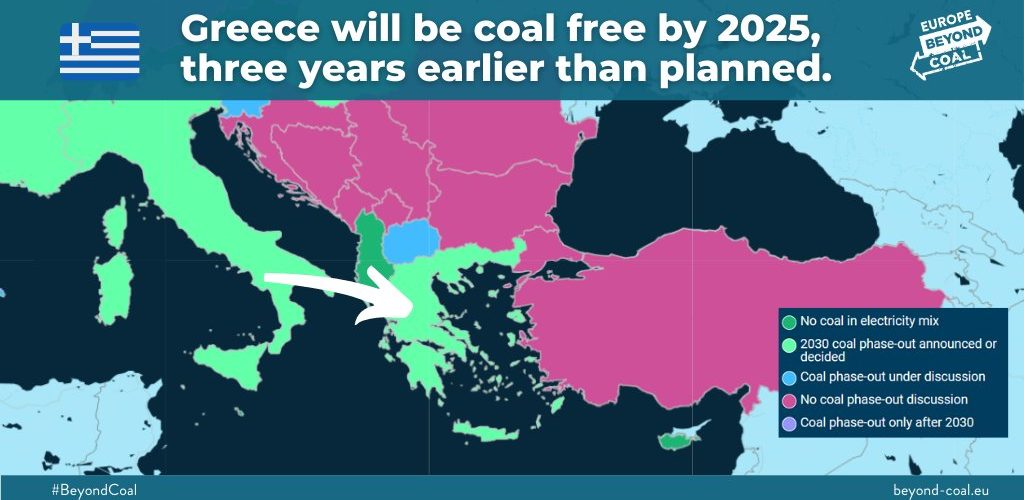The Europe Beyond Coal Campaign welcomes Greece’s earlier exit from lignite which is marked by PPC’s decision to convert its last lignite plant “Ptolemaida” 5 in a different technology by 2025, but warns against the wrong choice in the replacement technology.
It also urges PPC to draw on the conclusions of the recent techno-economic report of The Green Tank, ClientEarth and enervis and to select the only truly sustainable alternative, converting the lignite plant to a renewables-based thermal energy storage facility. The analysis showed that this solution, in addition to all its other advantages, is also more economically competitive compared to the replacement by a fossil gas plant, which PPC is leaning towards.
You can read the full press release by Europe Beyond Coal below.
You can also read about the techno-economic analysis on the replacement options for Ptolemaida 5 here.
Greece brings coal exit forward three years to 2025
ATHENS, 22 April 2021 – Greece will stop burning lignite to produce energy in 2025, making it the tenth European country to have already exited coal or to plan to do so by 2025. The accelerated coal exit comes after PPC decided –because of skyrocketing carbon permit prices– to abandon the original plan to operate its under construction Ptolemaida 5 lignite plant until 2028. PPC plans to close all of Greece’s other existing lignite plants by 2023. With Ptolemaida 5 not scheduled to come online until 2022, doubts persist about whether it will burn lignite at all.
PPC has sunk EUR 1.4 billion into Ptolemaida 5, but after numerous failed attempts to obtain a derogation for the plant, has decided to convert it into an unsustainable 1GW fossil gas unit in 2025. Greece’s plan to install six new fossil gas plants (3.3 GW) is already in contradiction of its National Energy and Climate Plan [1], without accounting for the addition of Ptolemaida 5.
“PPC has finally realised it has wasted billions on Ptolemaida 5, and caused untold damage to people’s health and the Greek economy,” said Mahi Sideridou, Managing Director at Europe Beyond Coal. “The fact that the EU’s fourth-largest lignite producer is abandoning coal tells you everything you need to know about the state of the industry. Now PPC needs to turn its full attention to the country’s enormous renewable energy potential. Former coal communities deserve far better than to be tied to more fossil fuels, like fossil gas.”
A comparative analysis of four different replacement options for Ptolemaida 5 conducted by the Green Tank, ClientEarth and enervis [2] shows that converting the lignite plant to a renewables-based thermal energy storage facility would produce cheaper electricity than switching to fossil gas under realistic carbon price scenarios, and would be fully compatible with the EU’s new 2030 climate target, the EU Green Deal and the Sustainable Taxonomy Regulation. Meanwhile, a new report by WWF [3] presents more than 50 combinations of renewable technologies to support a new district heating system in Western Macedonia, where the majority of Greece’s lignite plants will soon close.
“The decision to switch technologies in Greece’s last lignite plant Ptolemaida 5 by 2025 marks the end of the biggest cross-party mistake in recent Greek energy policy. PPC and the Greek government should avoid making another one, and scrap plans to switch Ptolemaida 5 from lignite to fossil gas. The conversion of the lignite plant to a clean energy storage facility will generate cheaper electricity, maintain jobs in a region plagued by high unemployment rates, and provide the country with much needed additional energy storage capacity”, said Nikos Mantzaris, Senior Policy Analyst for the Green Tank, and one of the main contributors of the techno-economic analysis for Ptolemaida 5.
“The constant rise of the CO2 prices is ramping up the pressure on coal power plants across Europe, but switching from coal to fossil gas is not the solution,” said Dimitris Tsekeris, Energy Policy Officer, WWF Greece. “Fossil gas is in the same position as coal was 15 years ago, and will face a similar crisis of stranded assets in years to come. We need to lock-in sustainable alternatives, not more fossil fuels. Fossil gas cannot be part of this plan.”



















































































































































































































































































































